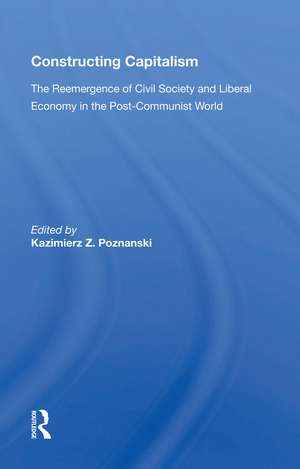Constructing Capitalism: The Reemergence Of Civil Society And Liberal Economy In The Post-communist World
Editat de Kazimierz Z. Poznanskien Limba Engleză Hardback – 31 dec 2023
Preț: 683.09 lei
Preț vechi: 991.13 lei
-31% Nou
Puncte Express: 1025
Preț estimativ în valută:
130.72€ • 136.31$ • 108.64£
130.72€ • 136.31$ • 108.64£
Carte tipărită la comandă
Livrare economică 20 martie-03 aprilie
Preluare comenzi: 021 569.72.76
Specificații
ISBN-13: 9780367004637
ISBN-10: 0367004631
Pagini: 230
Dimensiuni: 146 x 229 mm
Greutate: 0.59 kg
Ediția:1
Editura: Taylor & Francis
Colecția Routledge
Locul publicării:Oxford, United Kingdom
ISBN-10: 0367004631
Pagini: 230
Dimensiuni: 146 x 229 mm
Greutate: 0.59 kg
Ediția:1
Editura: Taylor & Francis
Colecția Routledge
Locul publicării:Oxford, United Kingdom
Cuprins
Introduction -- Regional Political Economy -- Mind and Body: Ideology and Economy in the Collapse of Communism -- Two-Tiered Stalinism: A Case of Self-Destruction -- Political Economy of the Eastern European-Soviet Trade: Rethinking the Past and Searching for the Future -- Reconstruction of Markets -- Property Rights Perspective on Evolution of Communist-Type Economies -- The Affinity Between Ownership and Coordination Mechanisms: The Common Experience of Reform in Socialist Countries -- Divestment of State Capital: Alternative Forms and Timetable -- Dilemmas of Democratization -- The Reconstruction of Citizenship: Reverse Incorporation in Eastern Europe -- From Social Idea to Real World: Clash Between New Possibilities and Old Habits -- Main Paradoxes of the Democratic Change in Eastern Europe -- Epilogue: Markets and States in the Transformation of Post-Communist Europe
Descriere
In this timely interdisciplinary volume, a renowned group of scholars provides a fresh look at transformation in Eastern Europe and the former Soviet Union, They argue that this lengthy and largely uncontrollable process will follow a different path from that blazed by Western democracies. The contributors perceive this process as a painful one, marked by trials and reversals. The most striking and current example of this uneven process considered is the attempted August coup and the subsequent fragmentation of the Soviet Union. Attributing the collapse of state socialism to ideological erosion combined with economic deterioration, the contributors contend that all major segments in these societies—including the party itself—participated in bringing the system down.
